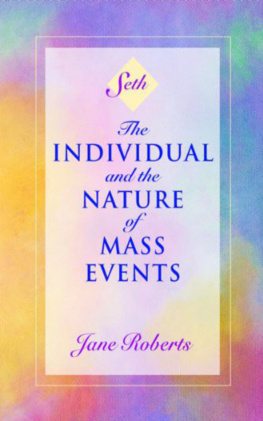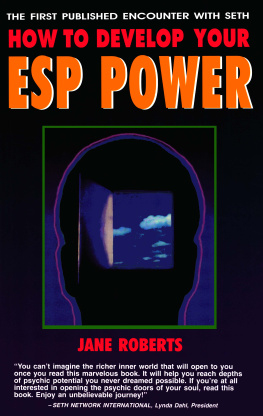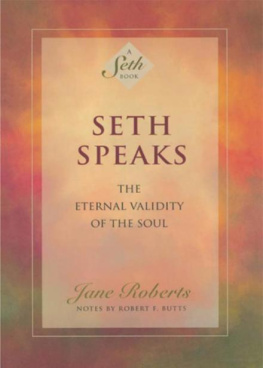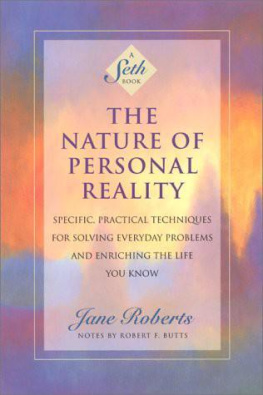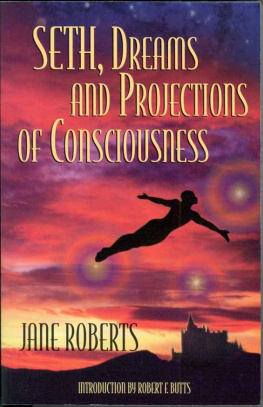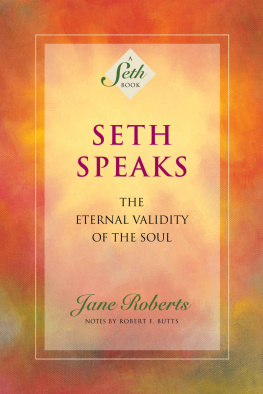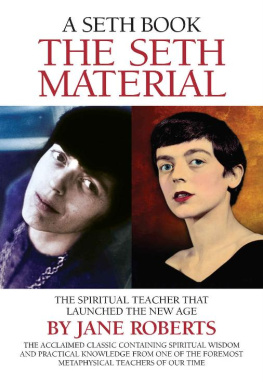CONTENTS
We have never told anybody to do anything, except to face up to the abilities of consciousness ."
Seth
April 19, 1978
A note by R.F.B.: Seth was often pretty outspoken in Mass Events when he discussed our medical beliefs and practices, and the unfortunate results they sometimes bring about. At the same time he tempered his ideas with passages like this one, from the 870th session for Chapter 10:
"Generally speaking, for example, if you are seriously worried about a physical condition, go to a doctor, because your own beliefs may overfrighten you otherwise. Begin with innocuous but annoying physical conditions, however, and try to work those out for yourself. Try to discover why you are bothered. When you have a headache or a simple stomach upset, or if you have a chronic, annoying but not serious condition, such as trouble with your sinuses, or if you have hay fever in those situations, remind yourself that your body does indeed have the capacity to heal itself."
A Psychic Manifesto
My life is its own definition. So is yours.
Let us leave the priests to their hells and heavens, and confine the scientists to their dying universe, with its accidentally created stars. Let us each dare to open our dream's door, and explore the unofficial thresholds, where we begin.
(A note by R.F.B.: This is the first verse of a long poem Jane wrote late in July 1979, as Seth was finishing his work on Mass Events. Among other things, the poem is a passionate declaration of psychic independence, written in response to Seth's ideas in this book.)
County would have been used to house refugees. Many spectacular national events have happened, of course, since our first sessions took place late in 1963, but Seth seldom mentioned such issues, and then only in answer to our own questions. In this current book, however, he discusses in depth how our private realities merge into mass experience. For that reason he examines the public arena, and devotes a good deal of material to Three Mile Island and to the Jonestown mass suicides as well. Both situations occurred as Seth was dictating this book, and while they are contemporary, both cases are classic in their implications.
Rob's notes provide the necessary exterior orientation for this present volume, as they do for the previous Seth books, and hint at the framework of normal life in which Seth so gallantly "appears" twice weekly, tossing off my glasses and thereby signaling the beginning of my trance. Besides this, of course, my own moods, speculations, joys and sorrows have spun their earthly web through my mind on such days. I may have worked well or poorly at my own writing. The day may have been calm or distracted by unexpected guests, or marked by any of life's normal domestic ups and downs.
While Seth was dictating Mass Events, for example, another of our cats (Billy) died. Seth was discussing the Three Mile Island accident, but he left off book dictation for a while because we felt so badly, and gave us some excellent material on animal consciousness before and after death because "tragedies" come in all shapes and sizes, and the most domestic events of our days offer Seth opportunities to comment on life itself.
So even if I was focused elsewhere and my consciousness turned inward, a spotlight was thrown upon our world from that other viewpoint, almost as if a character in one of your dreams suddenly came awake, walked out of the dream, and dared comment on our waking world. Perhaps this isn't a good analogy Seth is far from a dream character, and in fact I hardly ever dream of him at all but he is a personality whose platform of reality isn't the same as ours, a personality who writes books through me, but from his standpoint, not mine.
In this book he comments on our religions, sciences, cults, and on our medical beliefs as well, with an uncompromising wisdomas ifas if he represents some deep part of the human psyche that knows better, that has always known better as if he speaks out not only with my voice but for many many other people as if he represents the truths that we have allowed ourselves to forget.
What truths? That our dreams come alive at midday; that our feelings and beliefs turn into the reality we experience; that, in deeper terms, we are the events in which we participate, and that murder for the sake of an ideal is still murder. But more than this, Seth reminds us of something we knew as children: We are of good intent.
"You make your own reality." That statement is one of the cornerstones of Seth's material, stated almost from the beginning of our sessions and emphasized throughout his books. In Mass Events, though, Seth goes further, maintaining that our private impulses are meant to provide the impetus for the development of our own abilities in a way that will also contribute to the best interests of the species and the natural world as well. He's speaking of our normal impulses here, those that we've been taught are dangerous, chaotic, and contradictory. Seth maintains that we can't trust ourselves while distrusting our impulses at the same time. Much of this book is concerned with the purposes of our impulses, and the reasons for their poor reputations in the eyes of science and religion. What Seth is really saying here is that our impulses are meant to help us create our own realities on a personal basis in a way that will enhance both our private lives and our civilizations.
But if we are of good intent, how can we sometimes end up involved in the most reprehensible of actions? Seth faces such questions squarely, and deals with the motivations of both the fanatic and the idealist. And people are idealistic. Many readers of all ages write us, asking how they can develop their own potentials and also help bring about "a better world." They care deeply, and abhor the adverse conditions they see in society, whether or not they are intimately concerned with them. In this book Seth clearly shows how each of us can contribute to the mass reality, and concisely outlines the issues so that we don't fall prey to disillusionment or fanaticism.
Since we are all involved with world events, it is highly important that we also understand how we fit into those global actions, and see how our negative beliefs about ourselves and the species can result in situations far less than ideal, and quite different from our stated goals. For this reason, Seth explains how the theories of Freud and Darwin confine our imaginations and our abilities.
Rob and I grew up in the world of Freudian and Darwinian concepts too, of course. And we weren't given any magical immunity from the unfortunate results of such cramped vision. Those theories, along with religion's belief in the flawed self, have left their marks on all of our lives. Rob and I have been given a new, vaster philosophical structure through the Seth sessions, one that we share with our readers. And that structure is still emerging. It is far from finished. The answers are not all in. We are still learning how to ask the right questions.
When Seth began this manuscript, I was personally working with the idea of "heroic impulses" (those separate from our usual ones) that would operate as inner impetuses toward constructive action. In this book, though, Seth states that it is our normal everyday impulses that we must learn to trust. Even I was taken back! Our usual impulses? The ones I ignored while I was looking for the "heroic" ones? And finally I began to understand: Our normal impulses are heroic, despite our misunderstanding of them. In a way, this entire book is an introduction to our impulses, those we follow and those we deny.
I've had my own hassles with impulses, following only those I thought would lead me where I wanted to go, and drastically cutting down those I feared might distract me from my work. Like many other people, I thought that following my impulses was the least dependable way of achieving any goal unless I was writing, when impulses of a "creative" kind were most acceptable. I didn't realize that all impulses were creative. As a result of such beliefs, I've had a most annoying arthritis-like condition for some years that was, among other things, the result of cutting down impulses toward physical motion.

